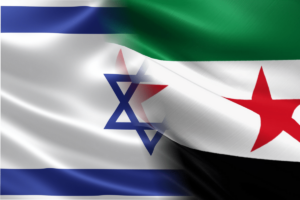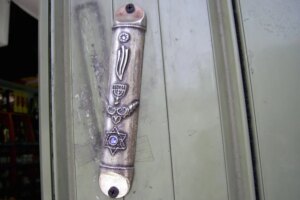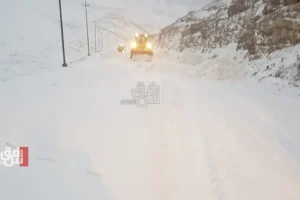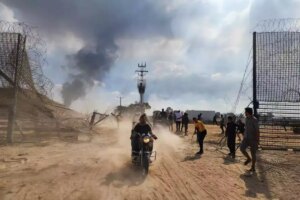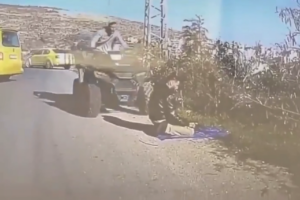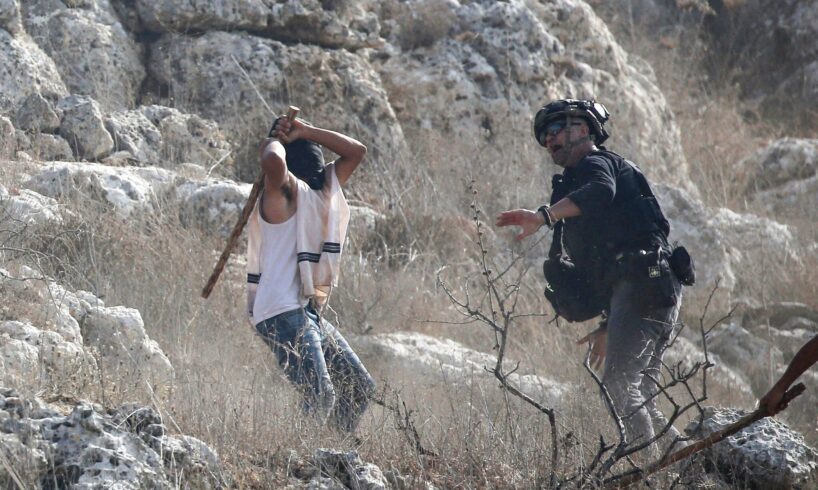
An organization representing international media in Israel, the West Bank, and Gaza on Monday condemned attacks by Israeli settlers on journalists in the West Bank, urging Israeli authorities to halt the “violence immediately.”
The Foreign Press Association (FPA), which represents hundreds of foreign journalists, said it was “appalled” by the recent attacks, especially during this year’s olive harvest.
“Journalists, both local and foreign, have proven to be a clear target as they document an unprecedented level of unchecked violence against Palestinians during this year’s olive harvest,” the association said, citing two incidents involving journalists from international media outlets.
The FPA said that on Saturday, two employees of Reuters wearing clearly marked press vests and helmets were assaulted by masked Israeli civilians armed with clubs and rocks near the Palestinian village of Beita.
“A mob of dozens of settlers beat one of the employees, a female reporter, while she was already on the ground, resulting in severe injuries,” the FPA said.
Get The Times of Israel’s Daily Edition
by email and never miss our top stories
By signing up, you agree to the terms
“They also attacked those who tried to help her. A Reuters security person was hit, and two Palestinian freelance journalists were injured while being chased.”
Palestinian photographer Raneen Sawafta is carried on a stretcher at Rafidia Hospital in Nablus after reportedly being injured by Israeli settlers while covering the olive harvest in the West Bank, on November 8, 2025. (JAAFAR ASHTIYEH / AFP)
On October 10, settlers beat a veteran AFP photographer with sticks when filming the olive harvest in the same area.
His car, along with a handful of others parked at a safe distance from the field, was stoned and then set on fire by the assailants.
“The photographer, who testified it was one of the worst attacks in his 30-year career, reported that Israeli forces at the scene refused to intervene, instead firing rubber bullets and tear gas at olive pickers and activists accompanying them,” the FPA said.
Several such incidents have occurred in the last few weeks, the FPA added.
“Israeli forces routinely harass and intimidate journalists, in some cases detaining them and threatening them with deportation,” the FPA said.
“This is all part of a deepening climate of hostility toward the media by Israeli authorities,” it added, urging the authorities to investigate the incidents and hold the perpetrators accountable.
“In particular, we urge [IDF] central command head Major General Avi Bluth and [West Bank] police commander Moshe Pinchi to uphold their duties to ensure that journalists can work freely and safely,” the association said.
“There cannot be press freedom in an environment in which journalists are threatened and harmed with complete impunity.”
IDF Chief of Staff Lt. Gen. Eyal Zamir (right) and Central Command chief Maj. Gen. Avi Bluth are seen at an assessment at the Central Command in Jerusalem, October 21, 2025. (Israel Defense Forces)
When contacted by AFP, the Israeli military did not give an immediate response.
An AFP journalist serves on the FPA’s board of directors.
In the wake of the settler attack near Beita, the IDF said at the time that troops had been dispatched to the area following reports of a clash between Israelis and Palestinians “during an uncoordinated olive harvest in an area that requires coordination.”
“Upon the forces’ arrival at the area of confrontation, where Palestinians and Israeli civilians were harvesting olives, several Israeli civilians threw stones at the harvesters,” the army said, adding that it had transferred the case over to the police.
The West Bank, which is home to more than two-and-a-half million Palestinians and over 500,000 Israeli settlers, has seen soaring violence since war erupted between Israel and Hamas on October 7, 2023, sparked by the terror group’s deadly invasion into Israel.
Since the start of the annual olive harvest season in mid-October, Palestinians have increasingly reported that they are being barred from entering their lands to harvest olives due to military restrictions. At the same time, when they are able to access their trees, attacks by Israeli extremists have allegedly continued unabated, locals and activists have charged.
Almost none of the perpetrators of attacks against Palestinian olive harvesters have been held to account by Israeli authorities.
Nurit Yohanan contributed to this report.
You appreciate our journalism
You clearly find our careful reporting valuable, in a time when facts are often distorted and news coverage often lacks context.
Your support is essential to continue our work. We want to continue delivering the professional journalism you value, even as the demands on our newsroom have grown dramatically since October 7.
So today, please consider joining our reader support group, The Times of Israel Community. For as little as $6 a month you’ll become our partners while enjoying The Times of Israel AD-FREE, as well as accessing exclusive content available only to Times of Israel Community members.
Thank you,
David Horovitz, Founding Editor of The Times of Israel
Join Our Community
Join Our Community
Already a member? Sign in to stop seeing this
